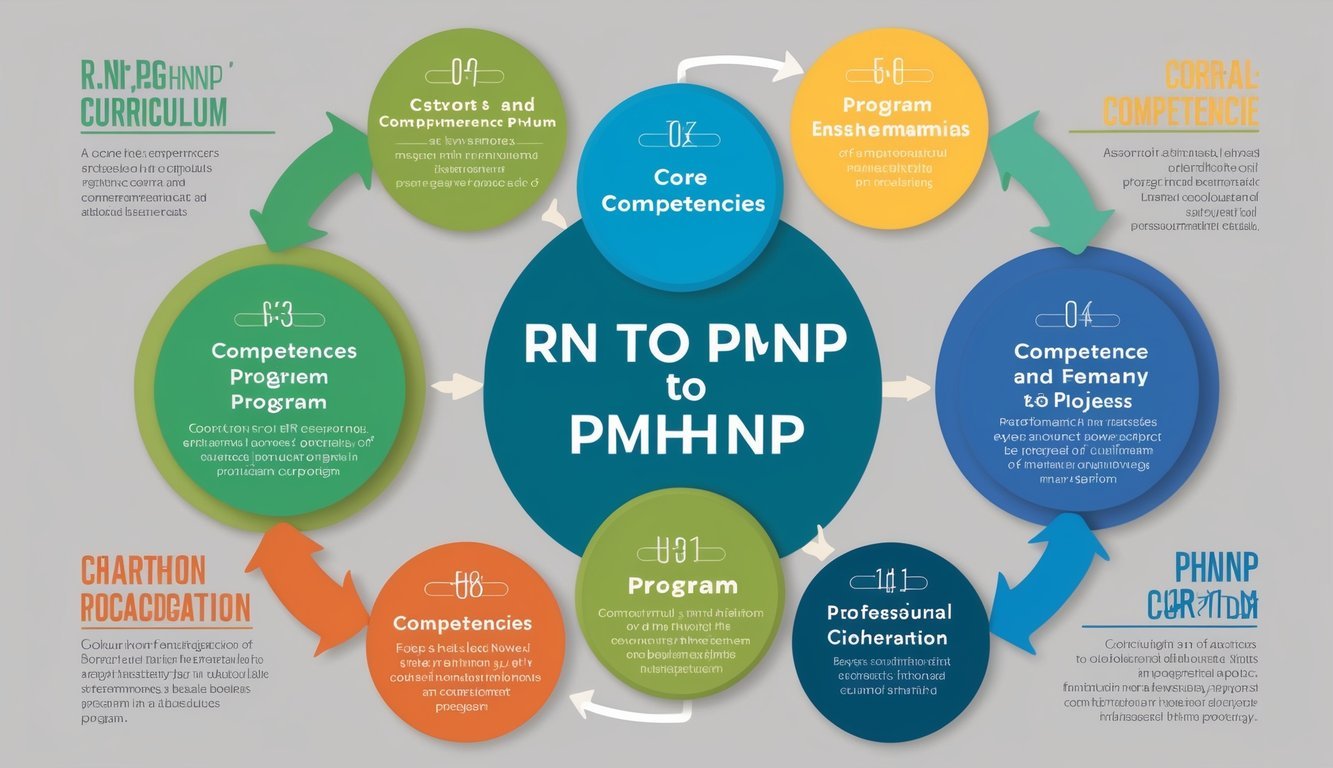If you’re a registered nurse considering a transition to a psychiatric mental health nurse practitioner (PMHNP) role, understanding the steps involved is crucial for your career advancement.
The RN to PMHNP path allows you to build upon your existing nursing skills while specializing in mental health care, addressing the increasing need for mental health professionals.
This journey typically involves enrolling in a master’s degree program tailored for RNs, which may accept those with an Associate’s Degree in Nursing (ADN) or a Bachelor of Science in Nursing (BSN).
Many programs offer flexible online options to accommodate your current work schedule.
As you progress through this program, you will gain advanced knowledge in mental health assessment and treatment, equipping you to effectively support patients facing mental health challenges.
This specialization not only enhances your nursing practice but also positions you to make a meaningful impact in a field that is vital to community well-being.
Pathways to Advanced Nursing

Pursuing advanced nursing roles, particularly as a Psychiatric Mental Health Nurse Practitioner (PMHNP), involves several critical pathways.
Understanding these pathways is essential for effective career advancement and meeting the specific requirements set by educational accrediting bodies.
Overview of RN to MSN-PMHNP Programs
The RN to MSN-PMHNP program is designed for registered nurses (RNs) seeking to advance their careers through a Master of Science in Nursing (MSN).
This program typically requires around 64 credits, integrating both core nursing concepts and specialized psychiatric training.
Many programs offer online or hybrid formats to accommodate your schedule.
You can find accredited institutions that provide these programs through organizations such as the Commission on Collegiate Nursing Education (CCNE) and the Higher Learning Commission.
These programs equip you with advanced theoretical knowledge and clinical practice, preparing you for the complexities of mental health care.
BSN Degree Advancement
For nurses with a Bachelor of Science in Nursing (BSN), bridge programs facilitate a smooth transition to MSN-PMHNP.
These pathways usually last 2 to 3 years, depending on your previous education and work experience.
RNs with a BSN can apply their foundational nursing knowledge, streamlining their education while gaining the specializations required for advanced practice.
Increased education directly correlates with higher earning potential.
According to recent data, graduates of BSN to MSN programs often report salaries exceeding $100,000 annually.
Accreditation and Educational Standards
Accreditation is vital when selecting an RN to MSN-PMHNP program.
Ensure that your chosen program is CCNE-accredited or recognized by the Higher Learning Commission.
Accreditation ensures that the institution meets specific educational standards necessary for quality nursing education.
Before enrolling, verify if the program meets state licensure requirements as well, which can vary significantly.
A program’s accreditation status can impact not only the quality of your education but also your eligibility for federal student aid and future employment opportunities in healthcare settings.
Core Competencies and Curriculum

In an RN to PMHNP program, understanding core competencies and the structured curriculum is crucial.
The following areas focus on essential skills, ethical considerations, and practical applications necessary for effective psychiatric mental health practice.
Psychiatric-Mental Health Care and Ethics
A strong foundation in ethics is vital for psychiatric-mental health nurse practitioners.
You will explore ethical principles like autonomy, beneficence, non-maleficence, and justice as they apply to mental health care.
Key topics include:
- Confidentiality and Informed Consent: Understand patient rights and the importance of maintaining confidentiality.
- Cultural Competence: Learn to provide respectful and inclusive care for diverse populations.
Graduate courses often focus on case studies that challenge you to apply ethical reasoning in real-life scenarios.
Engaging in these discussions enhances your ability to make sound clinical decisions aligned with ethical standards.
Pharmacology and Pathophysiology
Advanced pharmacology is a core element of PMHNP programs.
You will study pharmacodynamics and pharmacokinetics as they relate to various psychotropic medications.
Important areas of focus include:
- Medication Management: Learn to assess and prescribe medications, monitoring their effects on different patient populations.
- Pathophysiological Processes: Understand the biological underpinnings of mental health disorders, aiding in diagnosis and treatment.
Courses often integrate practical applications, giving you hands-on experience in medication regimen planning.
Familiarity with various psychotropic drugs enhances your capability to manage complex cases effectively.
Clinical Practicum and Experience
Clinical practicum is a fundamental aspect of your training.
It allows you to apply theoretical knowledge in real-world settings.
Key components include:
- Clinical Hours: Most programs require around 500 to 700 clinical hours, ensuring you gain substantial experience.
- Health Assessment Skills: You will refine your assessment techniques, learning to conduct thorough evaluations of mental health patients.
This segment also often involves interprofessional collaboration, where you work alongside other health professionals, fostering a holistic approach to patient care.
Engaging directly with patients under supervision helps build your confidence and competency in the field.
Licensure and Certification
Achieving licensure and certification as a Psychiatric-Mental Health Nurse Practitioner (PMHNP) is essential for advancing your nursing career.
It involves passing exams and meeting specific criteria set by various authoritative bodies.
Preparation for National PMHNP Certification Exam
Before taking the National PMHNP Certification Exam, familiarize yourself with the content outline provided by the American Nurses Credentialing Center (ANCC).
This exam evaluates your clinical knowledge and competencies required for practice.
To prepare effectively, consider these steps:
- Review Exam Content: Focus on areas such as assessment, diagnosis, and treatment.
- Study Resources: Utilize ANCC-approved study guides and online courses.
- Practice Tests: Take sample exams to gauge your readiness and familiarize yourself with the format.
The certification you earn will be PMHNP-BC, recognized nationwide.
State Boards of Nursing Requirements
Every state has its own board of nursing with specific requirements for PMHNP certification and licensure.
Generally, you must have:
- Active RN License: Hold an unencumbered Registered Nurse license in your state.
- Educational Credentials: Complete a Master’s degree or higher from an accredited nursing program, focusing on psychiatric mental health.
- Application Process: Submit an application along with requisite fees to your state board.
It’s important to consult your state’s nursing board for precise requirements.
This ensures you meet all criteria for obtaining your PMHNP license and certification effectively.
Professional Opportunities and Advancement

As a Registered Nurse (RN) transitioning to a Psychiatric Mental Health Nurse Practitioner (PMHNP), you open doors to numerous professional opportunities and advancements in your career.
This path offers significant benefits in clinical management roles and salary potential, enhancing your impact on mental health care.
Clinical Management and Leadership
In advanced practice, you may assume leadership positions within healthcare teams.
These roles not only allow you to guide and mentor other mental health professionals but also influence healthcare policy decisions.
You can specialize in areas such as:
- Clinical practice management: Overseeing operations and improving patient outcomes.
- Policy development: Participating in legislative initiatives aimed at enhancing mental health services.
- Educating future NPs: Taking on academic roles to train the next generation of psychiatric practitioners.
Leadership positions often involve interdisciplinary collaboration, requiring strong communication skills and a thorough understanding of healthcare dynamics.
You will be instrumental in shaping treatment protocols that align with evidence-based practices.
Higher Salary and Career Prospects
Transitioning to a PMHNP offers significant financial incentives.
According to recent data, the average annual salary for MSN-PMHNPs is approximately $109,308, which translates to about $52.55 per hour.
Factors influencing your salary could include:
| Factor | Impact on Salary |
|---|---|
| Geographic location | Variations based on demand |
| Years of experience | Increased pay with seniority |
| Specialization | Added earnings for niche roles |
Moreover, as healthcare continues to evolve, the demand for qualified psychiatric nurse practitioners is on the rise.
Your advanced training positions you well for roles that may have openings in various settings, including:
- Hospitals
- Private practices
- Community health organizations
Investing in this advanced degree not only elevates your professional status but also ensures you play a crucial role in addressing the growing mental health needs within communities.
Challenges and Opportunities in Mental Health Care

Navigating the complexities of mental health care presents both challenges and unique opportunities.
Addressing diverse needs within various settings can significantly impact patient outcomes.
Emphasizing interprofessional collaboration is key for providing comprehensive care to those with mental health disorders.
Addressing Mental Illnesses in Diverse Settings
Effective mental health treatment must adapt to different environments, including correctional facilities, domestic violence shelters, and outpatient clinics.
Special consideration is needed for each setting, as patients often face unique challenges influenced by their circumstances.
-
Correctional Facilities: These environments require specialized mental health services to effectively address the high prevalence of mental illness among inmates. Integration of psychiatric care can lead to reduced recidivism rates.
-
Domestic Violence Shelters: Support services must include mental health assessments and ongoing treatment options to address trauma-related disorders. Ensuring access to mental health resources can facilitate recovery and safety for survivors.
Adapting care approaches to meet the specific needs of these settings enhances the effectiveness of mental health interventions.
Interprofessional Collaboration and Patient-Centered Care
Interdisciplinary collaboration plays a vital role in delivering comprehensive mental health care.
Engaging with various healthcare professionals benefits you.
For example, counselors, psychologists, and social workers can work together to create a holistic treatment plan.
-
Benefits of Collaboration:
- Shared expertise improves patient outcomes.
- Collaboration also leads to streamlined communication among healthcare providers.
-
Implementing Patient-Centered Care:
Involving patients actively in their treatment decisions fosters trust and increases adherence to therapy.This collaborative approach can lead to better management of mental health disorders.
Investing in interprofessional collaboration not only enhances the quality of care but also provides opportunities for ongoing education and resource sharing among professionals.

